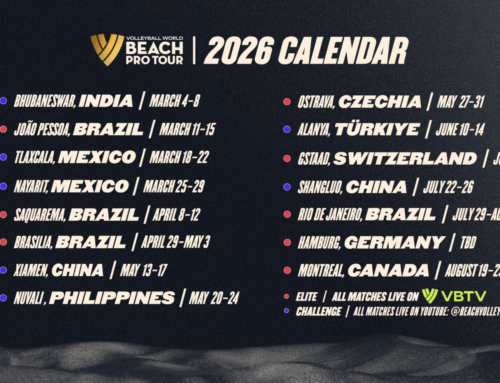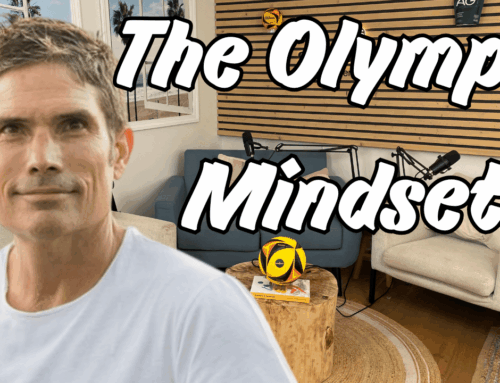HERMOSA BEACH, California — Alvaro Filho was the next in the long line of elite Brazilian defenders. Having begun playing the game late, at the age of 15, it took him all of seven years to be tabbed by one of the greats, Ricardo Santos, as his partner. He won his first tournament by 22, a Gstaad cowbell many covet but few attain. He was named Rookie of the Year.
He was inevitable.
And as Bruno Schmidt, the wizard he was dubbed, so magic he was with the ball, retired, choosing to pursue a career in law, Alvaro was the obvious heir to the throne. Emanuel Rego, long Alvaro’s inspiration in the sport, a man for whom he’d skip school to watch play, then shag balls for, then practice with, then compete against, now wanted to know something about Alvaro, something perhaps Alvaro hadn’t even considered himself yet.
“Do you want to be the greatest?” The Greatest himself asked Alvaro. “Or do you want to be a good dad?”
The answer came instantly, without thinking.
A dad.
He was still in his prime then and still, now only 34 years old, could be very much in his prime.
Does he have any regrets?
“No,” he said, and it was a warm smile, and it was not difficult to tell that he spoke as true as an arrow.
“The thing is, when you want to be in that hole and be a part of playing in the Olympic Games, you just forget about everything, you focus on one thing, the mission, and when I left for Tokyo [Olympics in 2021], we left a month and a half before to prep and play the Olympic Games, and when we left, my son had no teeth in his mouth, and when I came back, he had a mouth full of teeth,” Alvaro said. “I said ‘What in the world is going on over here?’ He was this size and now you are this size. It was a shock, and I said ‘I do not want to miss that.’ ”
Now Alvaro finds himself in a rare scenario where he can have it all: greatness in his professional pursuit while being a good father to his two children. When he had that conversation with Rego, and he knew, deep within himself, that playing at the highest level was no longer what he wanted most in this world, he called an old rival and good friend: Nick Lucena.
Lucena, like Alvaro, was one of the best of his generation, a defender who became No. 1 in the world and competed in a pair of Olympics. Lucena, like Alvaro, was a father who had found a new vocation in which to channel his knowledge and competitiveness: coaching NCAA beach volleyball. He asked if Lucena and his wife, Brooke Niles, needed an assistant at Florida State, and while they did not – they had just hired Brook Bauer – Lucena promised to recommend him when he saw an opening pop up at another program.
Quickly, one did.
Stetson, just a three and half hour drive down the road from Tallahassee, needed a new assistant after Jae-Lyn Visscher took the same job at South Florida and its upstart program. Niles called Stetson head coach Kristina Hernandez and made the introduction. Within a year of arriving in the United States, Alvaro had his next career.
“I’m going into my third season and I’m really happy as a coach right now,” he said. “For coaching, I believe I still can achieve greatness and be around my family. The tournaments right now, I go for three or four days and then go back home. Before, playing for Brazil, this was not achievable because I’d sometimes be gone for two or three months and it’s really hard. But I have a family and I have a choice. Now being a coach, I was always with just men but now I’m with women, and I had a girl, so my world is kind of pink right now. I’m learning a lot. I just imagine my little girl over there and it’s helped me know how to treat them better as a human being and teach them the right way to do stuff. We’re coaching volleyball of course but we’re teaching behaviors, and this is a big part of coaching to me.
“Right now I’m trying to switch to be a coach and it’s a process. It’s really hard. But I’m really happy because I feel like I can share and help and my spirit is full and happy because I can help others with what I learned in 15 years playing.”
Alvaro had every intention of retiring as a player after the 2024 season in which he partnered with Caleb Kwekel. But then Alison Cerutti, his good friend and partner during the Tokyo Olympics called.
This, he said, would be his final season. He wanted to play it with Alvaro.
“I thought ‘Oh my gosh!’ I got goosebumps at the time,” Alvaro said. “I felt really honored to play with him again.”
So play they will, one final time. They finished fifth in Huntington Beach, and will play their final tournament of the year – of their careers – in Manhattan Beach, a pair of legacies cementing themselves in the most iconic tournament in the sport. What Alison will do, where he will go, is unclear.
For Alvaro, though, the path has never been clearer: He is a coach.
He is a dad.
And when he thinks back to that conversation with Emanuel, he can know, in his new role, he can have it both: He can achieve greatness while still raising his children.
Alvaro Filho can have it all.


